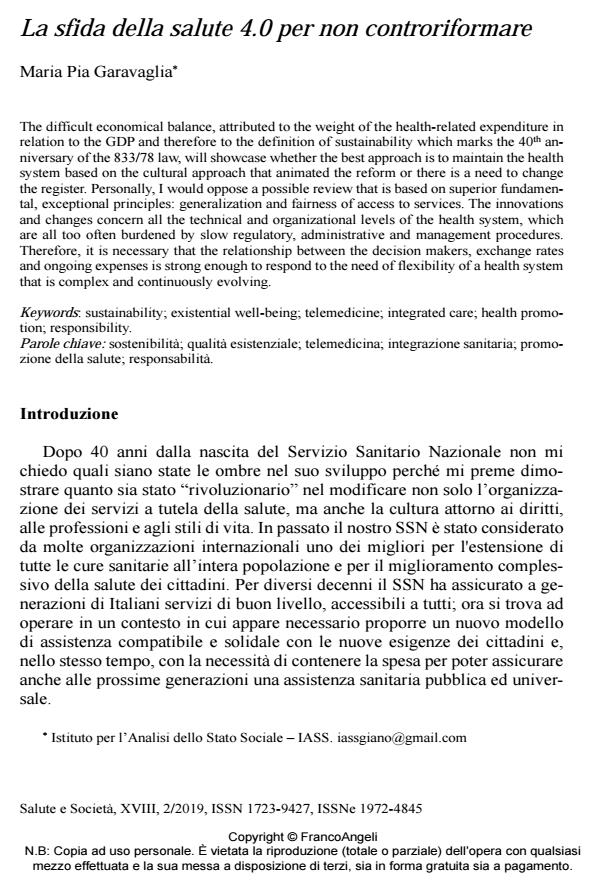La sfida della salute 4.0 per non controriformare
Journal title SALUTE E SOCIETÀ
Author/s Maria Pia Garavaglia
Publishing Year 2019 Issue 2019/2 Language Italian
Pages 11 P. 57-67 File size 156 KB
DOI 10.3280/SES2019-002006
DOI is like a bar code for intellectual property: to have more infomation
click here
Below, you can see the article first page
If you want to buy this article in PDF format, you can do it, following the instructions to buy download credits

FrancoAngeli is member of Publishers International Linking Association, Inc (PILA), a not-for-profit association which run the CrossRef service enabling links to and from online scholarly content.
The difficult economical balance, attributed to the weight of the health-related expenditure in relation to the GDP and therefore to the definition of sustainability which marks the 40th anni-versary of the 833/78 law, will showcase whether the best approach is to maintain the health system based on the cultural approach that animated the reform or there is a need to change the register. Personally, I would oppose a possible review that is based on superior fundamental, exceptional principles: generalization and fairness of access to services. The innovations and changes concern all the technical and organizational levels of the health system, which are all too often burdened by slow regulatory, administrative and management procedures. Therefore, it is necessary that the relationship between the decision makers, exchange rates and ongoing expenses is strong enough to respond to the need of flexibility of a health system that is com-plex and continuously evolving.
Keywords: Sustainability; existential well-being; telemedicine; integrated care; health promo-tion; responsibility.
- Ardigò A. (1985). Per una rifondazione del Welfare State. Milano: FrancoAngeli.
- Baines D. (2018). Chapter 3 - High-Cost Medicines in England. In: Zaheer-Ud-Din Babar, a cura di, Equitable Access to High-Cost Pharmaceutical. Vol 3. Academic Press, pp. 23-34. DOI: 10.1016/B978-0-12-811945-7.00003-8
- Bevan A. (1952). In Place of Fear. New York: Simon and Schuster.
- Ceruti M. (2018). Il tempo della complessità. Milano: Raffaello Cortina.
- Costituzione della Repubblica Italiana, Principi Fondamentali, Art. 3.
- De Luca E. (2010). I pesci non chiudono gli occhi. Milano: Feltrinelli.
- Hoffmann T.C., Montori V.M., Del Mar C. (2014). The Connection Between Evidence-Based Medicine and Shared Decision Making. JAMA, 312(13): 1295-1296.
- Jamali D., Hallal M., Abdallah H. (2010). Corporate governance and corporate social responsibility: evidence from the healthcare sector. Corporate Governance: The international journal of business in society, 10(5): 590-602. DOI: 10.1108/1472070101108556
- Robson W.A. (1976). Welfare State and Welfare Society - Illusion and Reality. London: Routledge.
- Van Eenoo L., Van der Roest H., Onder G., Finne-Soveri H., Garms-Homolova V., Jonsson P.V., Draisma S., Van Hout H., Declercq A. (2018). Organizational home care models across Europe: A cross sectional study. International Journal of Nursing Studies, 77: 39-45.
- World Health Organization & UNICEF (1978). Primary health care: report of the International Conference on Primary Health Care, Alma-Ata, USSR, 6-12 September 1978 / jointly sponsored by the World Health Organization and the United Nations Children's Fund, Geneva: World Health Organization.
- Wolf S.M., Clayton E.W., Lawrenz F. (2018). The Past, Present, and Future of Informed Consent in Research and Translational Medicine. The Journal of Law, Medicine & Ethics, 46(1): 7-11. DOI: 10.1177/107311051876600
Maria Pia Garavaglia, La sfida della salute 4.0 per non controriformare in "SALUTE E SOCIETÀ" 2/2019, pp 57-67, DOI: 10.3280/SES2019-002006